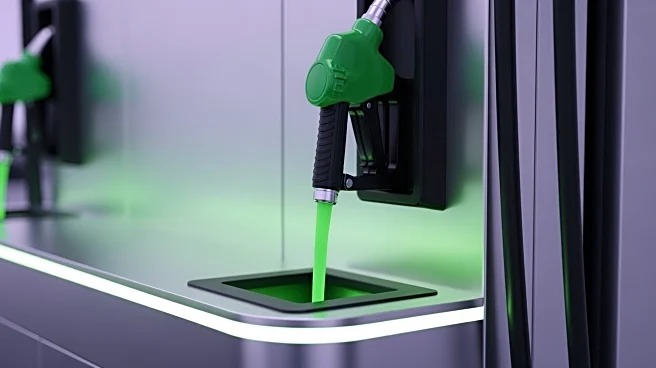What's Happening?
A new biodiesel blend, B-99, is gaining attention in the farming and trucking industries, with the first retail pumps opening in Iowa and Illinois. This renewable fuel is composed almost entirely of soybeans, cooking oil, and animal fats. Farmers like
Rob Shaffer in El Paso, Illinois, see this as an opportunity to boost demand for their crops and enhance national energy independence. The fuel is compatible with heavy-duty trucks through a system developed by Optimus Technologies, which allows trucks to switch from standard diesel to B-100 biodiesel. Companies such as PepsiCo and Archer-Daniels Midland (ADM) are already utilizing this technology, with ADM reporting significant reductions in carbon emissions from their fleet.
Why It's Important?
The introduction of B-99 biodiesel represents a significant step towards sustainability in the U.S. farming and trucking sectors. By increasing demand for soybeans, it provides economic benefits to farmers facing challenges from high input costs and low commodity prices. Additionally, the use of biodiesel can reduce carbon emissions, contributing to environmental goals. Companies like PepsiCo and ADM are leading the way in adopting this technology, which could encourage broader industry shifts towards renewable energy sources. This development not only supports the agricultural economy but also aligns with national efforts to reduce reliance on fossil fuels.
What's Next?
As the adoption of B-99 biodiesel grows, more companies may follow the lead of PepsiCo and ADM in retrofitting their fleets. This could lead to increased demand for the fuel and further expansion of retail locations. The success of these early adopters will likely influence other industries to consider similar sustainable practices. Additionally, ongoing technological advancements in biodiesel production and engine compatibility could enhance the efficiency and appeal of this renewable fuel.
Beyond the Headlines
The shift towards biodiesel like B-99 could have long-term implications for energy policy and agricultural practices in the U.S. It highlights the potential for a closed-loop system where agricultural products are used to produce energy, which in turn supports the agricultural sector. This model of sustainability could serve as a blueprint for other industries seeking to reduce their carbon footprint and promote environmental stewardship.















